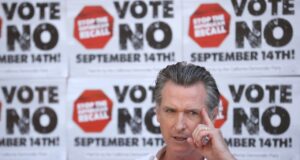This weekend, the scale a hip-hop artist could reach building a world around their personal brand was on display in Las Vegas when Travis Scott presented his version of the streetwear festival ComplexCon.
Billed as “CactusCon” — a name derived from the rapper’s Cactus Jack clothing and record label — the two-day event put Scott’s fingerprint on everything from shopping experiences to a “Cactus Jack-curated” hotel room for VIP ticket holders. Before it even started, analytics platform Launchmetrics reported that “CactusCon” generated $7.1 million in media impact value. (Disclosure: The author previously worked at Complex.)
At the same time in Los Angeles, hip-hop artist Tyler, the Creator hosted his 10th annual Camp Flog Gnaw festival with his latest album, Chromakopia, sitting at the top of the Billboard 200. While the festival focusses on music, it supports a larger creative ecosystem the artist has built that includes his 11-year-old clothing label, Golf Wang. The brand released its latest seasonal collection a day before it kicked off.
“It’s just so easy for an artist to call a buddy and design a T-shirt to sell it on a stand outside of the show,” said Golf Wang’s general manager, Ryan Nelson. “We do the most we can to tell a story and create a piece of art.”
Golf Wang and Cactus Jack are two of the powerful hip-hop brands growing in the midst of a shifting landscape. The past several years have seen an explosion of artist-centred brands, collaborations and partnerships as hip-hop drove culture globally, contributing to streetwear’s ascent, the meteoric rise and fall of the Yeezy collaborations with Adidas and Gap, and ultimately Pharrell Williams’ appointment as men’s creative director at Louis Vuitton.
But the space has become competitive and is no longer dominated by a single figure like Ye (formerly Kanye West) or even Travis Scott. The category is saturated with brands — not just merch — by rappers ranging from Young Thug’s Sp5der to Chief Keef’s Glo Gang, while the changing demands of streetwear’s customers mean these labels can’t just put out graphic T-shirts and expect people to line up. It’s forcing artists and brand partners alike to be more creative and build more engaging worlds to stand out.

“Are you doing something that’s really authentic and it’s something that the fan, the consumer, really wants?” said Allyssa Rapp, Puma’s head of entertainment and partnerships, who currently works on the German sportswear label’s ongoing collaborations with rappers A$AP Rocky and Skepta. “If not, it’s going to fall flat because there’s too much competition out there to just logo-slap something or pump out a campaign.”
Brands partnering with hip-hop artists are also looking for more than just a celebrity face these days. They want someone who’s going to be involved, and ideally have as much interest in the product as they do in their music.
Why Hip-Hop is Prioritising World-Building Over Merch
In part that’s because fans themselves are more involved. With the round-the-clock news circulating on social media and the more direct connections artists can build with their followers online, fan engagement is on a whole different level than it used to be.
“Back then a fan would buy music, they might listen to the CD a couple of times and that would be the extent of it,” said hip-hop music executive Steven Victor. “Now, they want to know what the artist is eating, drinking, wearing, what their thoughts are on politics… They’re really buying in.”
That holistic investment in the world of music artists presents opportunities for more elevated hip-hop lifestyle labels in his opinion. Recently, he unveiled an independently owned apparel extension for his music label and entertainment management company, Victor Victor Worldwide, in partnership with Japanese designer Nigo and his label Human Made. It includes garments ranging from driving suits to shoes and jeans, with samples being developed in Japan with premium materials.

Graphic hoodies to sell at concerts similarly don’t cut it at Golf Wang. Its seasonal collections offer a varied product assortment akin to streetwear brands like Supreme. The brand releases stylised lookbooks with its collections, and it keeps its distribution tight by not wholesaling to prioritise telling its own story at retail.
“The merchandise that Tyler makes is not his name and likeness on it. It’s thought-out designs,” said Golf Wang president Brad Scoffern. “This isn’t just an endorsement brand.”
For any artist with a number of creative endeavours, the time commitment of a brand can be difficult, creating a challenge for rapper-led labels. Although Scoffern said Tyler is still very hands-on with his Golf Wang label today, he hasn’t appeared in the brand’s lookbooks since 2017. Scoffern said it’s intentional, because a long-term goal for the brand, which he believes Golf Wang is achieving, is to be self-sustaining even without the founder’s constant endorsement of it.

Celebrity-centred lines that manage the feat are rare, according to Loïc Villepontoux, vice president of Billionaire Boys Club, the label founded by Pharrell and Nigo in 2003.
“As Pharrell sort of shifts his focus and interest, technically, that should have damaged our business,” he said. “Our business kept growing and today some people know Pharrell owns the brand and some people don’t. That’s a luxury we have.”
A Bigger Opportunity for Brands Than Another Celebrity Ambassador
Artists don’t just need to hustle for their own lines. Even brand partners are often looking for someone who will do more than just show up for photo shoots.
“I think brands these days are doing a good job of selecting who they want to work with and making sure that person they pick really has a passion for it,” said Victor. “They’re going to take it seriously and it’s not just about a check at the end of the day but an expression of themselves and what they got going on.”

Rapp said Puma’s hip-hop partners go “far beyond a traditional endorsement agreement.” They get involved in the design and marketing process, providing their thoughts on everything from the look of a product to the go-to-market approach to where the brand ultimately sells it. Rapp points out how Skepta created a separate Instagram “finsta” account dedicated to his ongoing Puma partnership, and how A$AP Rocky personally pushed for his collaboration to be stocked in the trendy Los Angeles retailer Maxfield.
Puma has teams dedicated to both Skepta and Rocky’s collaborations, and the opportunities go beyond campaigns and collaborative products. They might request Puma products for music videos, or in the case of Rocky and Skepta, as footwear for their recent European fashion week runway shows.
Complex NTWRK CEO Aaron Levant similarly said that, aside from generating “record-high” ticket sales and sponsorships, hiring Scott to serve as ComplexCon’s artistic director this year also opened the door for ComplexCon to access high-fashion labels they couldn’t access before, such as Rick Owens, Vetements and Mowalola.
“The creative team at Cactus Jack have put in 10 times the effort and the engagement that I could have ever expected,” he said.
Cultural Headwinds
There are some signs that hip-hop’s cultural power could be waning, which would strip away the cachet that has made its artists so highly sought after. Although it remains the most-consumed form of music within the US, it’s losing market share to genres such as Latin, rock, pop and country. According to Billboard, hip-hop’s share of the US music market hit a peak in 2020 and has slowly declined since, falling from 26.7 percent in 2022 to 22.3 percent in 2023.
This year, Off-White, a brand that represented the stunning heights a label fuelled by hip-hop and streetwear could reach, was also sold by LVMH to the brand conglomerate Bluestar Alliance. Despite the inroads Off-White made within luxury, it met a surprisingly similar fate to hip-hop brands of the past that were also sold to larger management companies like Iconix, which focusses on the mass-licensed apparel market.
Industry insiders aren’t concerned that hip-hop’s cultural force could diminish. Levant, who has been a part of the streetwear industry since the early 1990s, acknowledges that streetwear is currently in a down cycle and that other emerging music genres have shaken hip-hop’s leading position in culture. But he also believes trends are cyclical and that both artists and brands have to remain true to who they are.
Puma’s Rapp added that contemporary hip-hop in particular has created artists that defy the boundaries of music. It’s irrelevant if hip-hop’s hold is slipping, because they can’t be categorised as just hip-hop, while their value as partners extends beyond just music to areas like fashion and design.
The rise of labels such as Denim Tears and events like the upcoming Black Dandyism exhibit at the Metropolitan Museum of Art’s Costume Institute also spotlight how Black culture and expression continue to move the needle for fashion — even when the larger luxury industry continues to grapple with a lack of diversity. Hip-hop remains a vital part of that.
Victor dismisses any metrics about hip-hop’s dimming cultural impact, noting that Louis Vuitton recently named rapper Pusha T a new house ambassador.
“They know that they have to tap into the culture,” he said.




